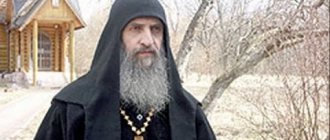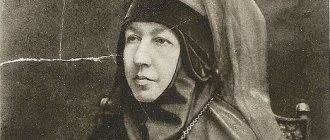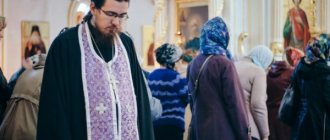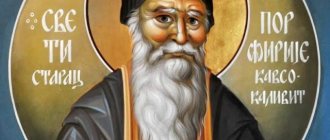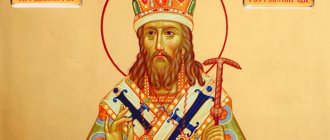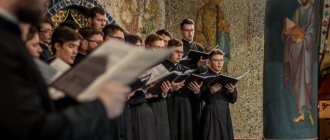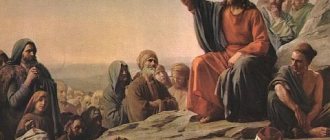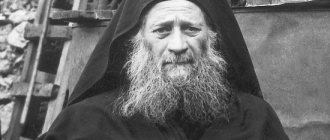Biography
The biography of schema-abbot Savva is not available in full. For many years his path is simply unknown, but the most basic, key points can still be found.
The boy was born on November 11 (25), 1898 in the most ordinary peasant family of Ostapenko at that time. Father Mikhail immediately gave his son the name Nikolai. He was not the only one in the family. Besides Kolya, there were 3 more sons and 5 daughters. My parents were deeply religious people, so they instilled love for the Lord and their children.
There was never any evil, rudeness or serious punishment in the family. By their own example, parents showed what a good person should be. Kolya has been interested in religions since childhood. He studied well at parochial school and attended all services.
Schema-abbot Savva (Ostapenko)
Already in his youth, the young man had a strong desire to become a priest. However, in 1914, Nikolai entered the army, prematurely due to the outbreak of the First World War. Three years later, already serving in the Red Army, the future schema-abbot received the position of military technician at the school. Later he becomes a foreman.
Despite the policies of the Soviet government, Nikolai often attended church. Since childhood, he retained his love for Christianity. Nicholas often read spiritual books in order to achieve insight and finally become a priest.
The schema abbot himself will later tell you that dreams played a huge role for him. So, in one of his night visions, Nikolai saw the dead, for whom he had just prayed and for whom he read the akathist.
A little later, after a conversation with schema-nun Martha, Nikolai received a lesson from her about correct prayer. That same night he had a dream about how he visited all the holy places in the life of Jesus. Later, Martha herself would become a close friend of the schema-abbot. She will help him on his spiritual path.
This is interesting! A schema-nun is a female nun who has accepted the great schema, which means her complete renunciation of the world and worldly life. A woman renounces this and becomes one with God, first in life, and then in life.
Instructions for the laity. Schema-abbot Savva (Ostapenko)
The world is in a state of slumber, sinful sleep, sleeping. God will awaken him with wars, pestilences, fires, devastating storms, earthquakes, floods, crop failures... Alas! He does not hear the voice of God!People are resting on a bed of laziness and self-delusion, and have forgotten to even think about salvation. There is no time: you have to grumble, then sleep, then judge others, and there are many others, well, there is no time to think about your soul and about eternity!
Throughout their entire earthly life, people seek everything except Christ the Giver of Life, and that is why they are devoted to all sorts of passions: unbelief, lack of faith, greed, envy, hatred, ambition, pleasures in food and drink, and other passions.
Only at the end of their life do they seek Christ in communion, and then out of blatant necessity, and then as if according to a custom accepted by others.
It is strange and pathetic to see for what empty reasons the devil deprives us of love for God and neighbor: because of the dust of the earth, because of money, because of food and drink, clothing, housing. He who strives for salvation should not have an addiction not only to food and drink, to clothing, to a spacious and well-decorated home, to rich household utensils, but to his health, even to his life, he should not have the slightest addiction, having surrendered his whole life to his will The Lord's.
Addiction to temporary life, to health, leads to many deviations from the commandments of God, to indulgence of the flesh, to breaking fasts, to despondency, impatience, and irritability.
Unlucky is he who loves beyond the measure of convenience in life. Having furnished himself with all kinds of comforts, he will shun any inconvenience, become pampered and will not get used to patience. Meanwhile, the life of a Christian is all inconvenience, the path is narrow and rough, there is a cross that requires inconvenience and great patience.
His heart will love the comforts of this world, and not Christ the Crusader. Endure the inconvenience, get used to the inconvenience. “If you have the skills, you will be content,” says the apostle.
The one who loves ornaments for his body and seeks honors is ill-fated: he will make a shameful idol of himself.
Envying honors, wealth, clothes - there is madness.
Wealth is the most agile minion in evil, because with power everything is more convenient to do evil.
A gift makes even wise men, seeing, not see. Gold is a trap for people, like a net for birds.
A busy mind is a moth that wears away the bones. The mind is blinded by three passions: love of money, vanity and voluptuousness.
Do not feed your flesh with partiality, do not caress it, do not please it, and do not strengthen it thereby against the spirit. The spirit will be a slave to the flesh.
Nothing extinguishes the spirit of faith in us so quickly as intemperance, delicacy and satiety, an absent-minded, riotous life.
Deny yourself sensual pleasures in the hope that instead of them you will receive higher, spiritual, divine pleasures.
Zealous for piety! You will have to hear, and perhaps often more so from your family, that you are a difficult, unbearable person. You will see strong dislike towards yourself, enmity for your piety, although those at enmity will not express what kind of piety they are enmitying against you - do not be indignant at this and do not fall into despair, because the devil can indeed exaggerate some to enormous proportions. your weaknesses, from which you are not free as a person, but remember the words of the Savior: “A man’s enemies are his own household” (Matthew 10:36), and correct yourself from your shortcomings, and hold fast your piety.
Look at yourself impartially. In fact, aren’t you heavy in character, especially for your family?
Maybe you are gloomy, unkind, uncommunicative, taciturn? Open your heart for sociability and affection, but not for indulgence.
Be meek and not irritable. Be patient. Only calm and meek reproofs admonish people. Cruel people are more annoying than useful.
The gift of forgiveness is higher than the gift of correcting with punishment.
Don’t reprimand for everything - endure others, passing in silence, and turn a blind eye to it: “Love covers everything and endures everything.”
We are surrounded by temptations everywhere, but you can live among sinners and not sin yourself. You must always and everywhere maintain the burning of your soul, and then it will be easy to endure all insults.
When we have Christ in our hearts, then we are happy with everything: inconvenience for us is like the best comfort, and bitter is like sweet, and poverty is like wealth, and hunger is like satiety, and sorrow is like joy!
The human soul is a free force, for it can become either a good or an evil force, depending on the direction you yourself give it.
An evil force forces a proud person to see only bad things in others, and he rejoices when they say bad things about them, but you act differently: be jealous of mutual love and do not judge anyone. Everyone will give God an answer for themselves, but look within yourself! Beware of malice! Find something good in an evil person and rejoice about this goodness and speak with joy about his good qualities.
There is no person who does not have some kind of goodness. Cover the evil that is in it with love and pray to God for it.
Live with everyone in peace, harmony, love, silence, respecting others, be condescending to their weaknesses, do not be proud, do not envy, do not quarrel, curb carnal lusts, be chaste, abstain from all excess, share with the poor, pray for everyone as for yourself, especially for those who are a burden to you, who humiliate, upset, insult you, and make false accusations. They are evil to you, and you do good to them. Do not wish or do harm to anyone.
You must love your enemies: after all, the devil teaches and incites them to be hostile in order to test you whether you love your neighbor according to the Gospel. Pay attention to yourself when people offend you, scold you, laugh at you. If you are calm at this time, are not filled with the spirit of enmity, hatred, impatience, if you continue to love these people the same way as before, then you love your neighbor according to the Gospel, and if you are irritated, then you do not love. “If you love your friends only, what grace have you?”
Nothing makes us more like God than when we forgive evil people who offend us.
Prayer for enemies is mercy (alms) above all alms given to the poor.
If the poor persecute you every day, it means that God’s mercy is constantly pursuing you:
“Blesseds of mercy, for there will be mercy” (Matthew 5:7). Who will run away from the mercy of God? All sacrifices and alms to the poor do not replace love for one’s neighbor if it is not in the heart, therefore, when giving alms, you should always make sure that it is given with love, from a sincere heart, willingly, and not with annoyance and grief. The very word “alms” shows that it should be a deed and a sacrifice of the heart and given with tenderness or regret for the poor state of the beggar and with contrition for one’s sins, for the cleansing of which alms are given, for alms cleanses all sin.
He who gives alms reluctantly and with annoyance, stingily, has not known his sins, has not known himself.
Alms are a benefit primarily to the one who gives them. Alms blot out sins, kill death, and extinguish the eternal fire of torment.
When you give alms, give with generosity, with kindness in your face, provide more than what is asked. Do not try to distinguish the worthy from the unworthy: let all people be equal to you for a good deed. For in this way you can also attract the unworthy to goodness, because the soul, through the physical, is soon drawn into the fear of God.
God save you from sparing your material property as a sacrifice to the Lord, or to His Most Pure Mother, or to other saints of God and, thus, preferring substance to spirit. See to it that your wealth does not become your destruction.
You must firmly believe that instead of perishable blessings, the Lord or His saints will reward you with incorruptible blessings, and instead of temporary blessings, with eternal ones. And spiritual blessings: spiritual light, forgiveness of sins, the gift of living faith, strong hope and unfeigned love, peace and joy in the Holy Spirit - are infinitely higher than material gifts.
How difficult it is at the hour of death for a person who did not give alms and who in this life had money, or food, or drink, or earthly honors as an idol.
Now he doesn’t need all this, but meanwhile his heart is firmly attached to them. He does not have the true treasure that gives eternal life, that is, the virtues of non-covetousness and mercy. Can he hope for God’s mercy without showing mercy to his neighbor? “With the measure you use, it will be measured to you” (Matthew 7:2).
So, in order to make it easier to die—and everyone must die—one must not have attachments to anything in the world, one must curb passions, have abstinence in everything, and show mercy to one’s neighbors.
When you see the painful destruction of the body, do not murmur against the Lord, but say: “The Lord is given, the Lord is taken away. Blessed be the name of the Lord." You are accustomed to looking at your body as an inalienable property, but this is extremely unfair, because your body is God’s building.
Man has many habits that are harmful to the body and harmful to the soul. Of these sinful habits, perhaps the most disgusting are drunkenness and smoking tobacco.
The sight of a disgracefully drunk man evokes in us involuntary disgust, and if we do not despise him, the unfortunate one, but feel sorry for him, then we do this only because our Most Loving Lord Jesus Christ commanded us to love our neighbor.
Smoking tobacco is just as sinful and unhealthy as drinking, but many people call it innocent fun. Can a passion for tobacco be called innocent fun when not only the one who smokes suffers from it, but also the one who is forced to breathe stinking air poisoned by tobacco smoke? The saddest thing is that smoking tobacco sets a bad example for children.
Another bad habit is swearing. During a curse, a foul-mouthed person’s lips drip with blood, their veins burn, and a foul stench emanates from his mouth: such a person, unless he repents, cannot enter the Church of God and touch the shrine. The Guardian Angel of such a person cries, and the devil rejoices. From such a person the Mother of God takes away Her prayer cover and She Herself retreats from him. Such a person exposes himself to a curse. We cannot eat or drink with such a person until he stops using swear words.
For blasphemy, God allows troubles, illnesses and many misfortunes to befall a person. Therefore, let us leave behind the custom of wicked people and listen to the Apostle Paul, who exhorts: “Let every word that is corrupt come out of your mouth” (Eph 4:29), but rather, let us accept the Jesus Prayer in our mouths and in our hearts, and thereby we will be delivered from eternal torment forever. centuries. Amen.
Don’t stare at the beauty of a person’s face, but look at his soul.
Do not look at women’s faces (for a woman, at men’s faces), avoid remembering them, drive away and immediately cut off every unclean thought as soon as it appears in your soul.
Avoid obscene jokes, conversations, do not read books that describe unclean love.
It is indecent for women to show masculine character in themselves; any rule other than modesty is alien to a well-behaved woman.
And you, who have been bound by an honest marriage in this life, apply your mind to how you can bring more fruit into the heavenly winepress!
Man is the house of God, but through our lust we turn our house into a dwelling of passions, for which we receive as punishment dead fruits during the birth of our wives.
Parents must keep themselves pure even before the conception of a baby in the mother's womb, must avoid immoderate carnal intercourse, must have a separate bed from each other on the nights preceding holidays and Sundays, on Wednesdays and under the heels and during all four fasts established by the Holy Church , especially during Lent, and immediately after the conception of the fetus, throughout pregnancy until birth and even before feeding the baby with mother’s milk, to live in purity, absolutely without cohabitation.
During pregnancy, the mother should concentrate all her attention on how to preserve the baby in the womb, remembering that he is the future temple of God and the dwelling of the Holy Spirit.
A Christian mother must protect not only physical life and health, but especially spiritual and moral life, remembering that during uterine life the baby perceives the spiritual and moral qualities of its mother. Feeding on her physical juices, he also feeds on her spiritual nature, living her life. That is why a Christian woman, while wearing it, must pray to God as often and as earnestly as possible, reflect more often and longer on the wise properties and works of God, and must also certainly lead a moderate and strictly abstinent life, remembering that character and moral and spiritual character depend on all this. her baby.
Parents should baptize their children as soon as possible upon birth.
The Most Holy Sacrament of Baptism is the most important gift to humanity from our Redeemer. The sacrament of baptism destroys original sin, that is, that moral corruption of our nature that passes through natural birth from ancestors to descendants and which prevents a person from developing morally and improving in goodness.
Unbaptized children should be treated the same as stillborn children. Giving them Christian names and remembering them at church services should also not be done; Their fate is the same as that of the stillborn, that is, they will not be punished, since they have not yet committed sins due to their youth, but they cannot be awarded complete bliss, as they have not been cleansed from original sin.
It is a great sin for parents if, through their fault, especially through negligence, their children die unbaptized. If there is no priest nearby, and the newborn child is weak and his death can be expected, then let one of the Orthodox Christians present here - a layman or a monk - perform baptism on him.
Baptism is performed like this: they immerse, and if the baby is sick, then sprinkle it with sacred (baptismal) water three times, saying:
“A servant is baptized (or a servant of God - a Christian name is given) in the name of the Father. Amen. And the Son. Amen. And the Holy Spirit. Amen".
If after this the baby remains alive, then he must be presented to the priest and declared that so-and-so performed holy baptism on him. The priest does not repeat, but only complements baptism and performs the holy Sacrament of Confirmation over the baby.
For violation of the purity of married life by parents, children will be born not to console them, but to their sorrow and tears and to the detriment of their fatherland: they are corrupted in character, capable of accepting all evil from their youth, and are also often born dead. Often, during childbirth with them, the mother herself dies in severe suffering.
These are the fruits for violating marital rules, for non-observance of fasts and any intemperance, for childbearing is a gift of God, and not a human invention.
The Lord gave the wife to the husband as an assistant for mutual cohabitation, blessing them, saying to them: “Grow and multiply” according to the natural law of nature, given to all creatures by God, and not for the sake of lustful sensuality, which knows neither time nor measure. Dumb animals, when offered, strictly observe this law, for after the conception of the fetus until the time of its departure, and even until feeding with milk, they resolutely do not allow cohabitation.
Man is sometimes worse than senseless cattle, being carried away by passionate lust, forgetting his dignity given to him by God, who created man in His image and likeness. By abusing nature to insult his honor, a person provokes the righteous wrath of God on his entire family (up to the fourth generation).
What terrible disasters are exposed to a family that violates the rule and purity of marriage! The Lord betrays them into an inexperienced mind to do inappropriate things: unfaithfulness of spouses, disorder and all sorts of troubles. Children suffer from incurable illnesses, then the premature death of a husband or wife, as well as the children of their loved ones.
Therefore, I beg you, repent with all your heart, confess your sins to your spiritual father, correct your life in everything and keep your holy marriage in all purity and righteousness of God, walking according to the commandments of God, then see on yourself and on your children a blessing from above for generations and generations. generation, according to the false promise of our Lord Jesus Christ.
From the vision of Gregory, a disciple of St. Basil the New, about the Last Judgment, it is clear that in the future life the Lord gives to infants who are not enlightened by holy baptism a restful place and the fate of the pleasures of eternal life in heavenly villages. These testimonies provide some consolation for parents grieving over the afterlife of dead infants who were not enlightened by holy baptism.
On the other hand, such a death of infants was allowed by God only for the sins of their parents, and therefore parents must bring sincere repentance before God for their sins, correct their lives by frequent and fervent prayers in church and at home, observing fasts, loving their neighbors, almsgiving.
Mother’s prayer for a stillborn child: “Merciful God, have mercy on my child who died in my womb, and for my faith and tears, do not deprive him of Your Divine light.”
A baby, whose mother died with him during pregnancy, at the resurrection will appear as a perfect husband and will recognize his mother, and she will recognize her child. Those who have not seen each other here will see each other there.
In the resurrection there will be neither old nor small. Those born prematurely will appear the same as adults.
The fornicator who destroyed the fetus conceived in her womb so that he would not see this world, and she herself would not see the next century. Just as she did not allow him to enjoy life and light in this century, so he will deprive her of life and light in the next. Since she decided to destroy her fetus in the womb prematurely in order to hide it in the darkness of the earth, then she herself, like a dead fetus, will be cast out into utter darkness. This is the reward for fornicators who encroach on the lives of their children. The judge will punish them with eternal death and cast them into the abyss of torment, full of fetid decay.
Parents and educators! With all care, guard your children against whims, otherwise the children will soon forget the value of your love, infect their hearts with malice, drown out their conscience, early lose the holy, sincere, ardent love of their hearts, and upon reaching adulthood they will bitterly complain that in their youth they are too cherished them a lot, indulged the whims of their hearts.
Caprice is the germ of heart corruption, the rust of the heart, the moth of love, the seed of malice, an abomination to the Lord.
Parents will not only be punished for their sins, but also for their children if they have not raised them in piety.
Pay special attention to maintaining the purity of conscience of your children and pupils. Conscience for them should be a good guide and judge throughout their lives. Make sure that they do not grow unscrupulous and become a plague on society and the cause of your tears.
A person who is unscrupulous (in the sense of drowning out her voice through negligence and passion for sin) is the most crafty and therefore the most terrible for others and the most unhappy for himself.
A wondrous power in man is conscience! You can’t escape from her, you can’t hide anywhere - she’s with us everywhere, she sees everything, she knows everything: not only our deeds, but also our thoughts and intentions; There is nothing secret for her; for her, night and day are like day. This is the wonderful guard placed over man by the Creator.
Conscience is a mirror, before which not a single vice can be hidden; an accuser who haunts; a witness who cannot be contradicted; a judge who cannot be resisted. Conscience, according to John Chrysostom, is a never-silent accuser within us, which cannot be deceived or seduced.
A person who has committed a sin and committed an unlawful deed will have time to hide from all people, but he cannot hide from this judge; on the contrary, he always carries within himself this accuser, which worries him, torments him and never subside. Like a diligent doctor, she does not cease to apply her healing, and even if they do not listen to her, she does not lag behind, but continues to constantly take care, constantly reminding about sin, not allowing the sinner to reach oblivion, so that at least through this he will make us not so prone to past sins.
A person with a clear conscience, even an uneducated one, is superior to any educated person who has suppressed his conscience.
In an uneducated person, simplicity of heart, meekness, kindness, silence, patience are more precious before God than all our knowledge, all external polish, all memorized expressions, all sugary politeness, all intricately woven speeches, even their very sins, like sins of ignorance, are more excusable. Therefore, respect simple ignorance and learn from it simplicity, kindness, patience and other virtues.
The uneducated are babes in Christ, to whom the Lord sometimes reveals His secrets.
When the Savior of the world wanted, in His infinite goodness, to fulfill at the end of the ages the Eternal Council for the salvation of the human race perishing by sin and to find the missing royal drachma, to seek the lost sheep of His verbal flock, then, taking upon Himself a human form and putting on the whole man from the Holy Spirit and Mary the Virgin, He chose as assistants to Himself, His great work, simple disciples and apostles, fishermen by occupation, and through them He showed in practice that the work of our salvation does not depend on worldly nobility, learning or earthly wisdom, but that it is the only work of God, the work of His goodness, wisdom, power, mercy.
It is in vain that we are accustomed to imagining saints as nothing other than surrounded by various signs and wonders of heaven, eating nothing, never sleeping, walking on water, etc. Not all saints were miracle workers, just as not all those who became famous in life for working miracles were saints. God only wants and demands from us that we be saints. You can be saints without withdrawing from society and without abandoning the world. Believe from your heart everything that the Holy Church teaches, and live as it demands; otherwise, be a true Christian and you will be a saint.
Silence, of course, is a good thing, but whoever is called to serve in society should not leave this without special instructions from the Providence of God.
From the book “The Lord is Close to Us: Biography, Memoirs of Spiritual Children and the Works of Schema-Abbot Savva (Ostapenko),” published by the Sretensky Monastery.
Books and works
During his long life, Savva wrote many books dedicated to the Lord. For example:
- “A brief explanation of the most important rules and customs of the Orthodox Christian faith”;
- "On Repentance";
- “About earthly and heavenly rewards”;
- “On the main Christian virtues and pride”;
- "On the Divine Liturgy."
Schema-Abbot Savva's book "Light in the Heart"
These works glorified the schema-abbot and brought him closer to God. They address a wide variety of topics and will always be able to help the true believer looking for answers.
Excerpt characterizing Savva (Ostapenko)
“The news is true,” said Bolkhovitinov. - And the prisoners, and the Cossacks, and the spies - they all unanimously show the same thing. “There’s nothing to do, we have to wake him up,” said Shcherbinin, getting up and approaching a man in a nightcap, covered with an overcoat. - Pyotr Petrovich! - he said. Konovnitsyn did not move. - To the main headquarters! – he said, smiling, knowing that these words would probably wake him up. And indeed, the head in the nightcap rose immediately. On Konovnitsyn’s handsome, firm face, with feverishly inflamed cheeks, for a moment there remained the expression of dreams of a dream far from the present situation, but then suddenly he shuddered: his face took on its usually calm and firm expression. - Well, what is it? From whom? – he asked slowly, but immediately, blinking from the light. Listening to the officer’s report, Konovnitsyn printed it out and read it. As soon as he had read it, he lowered his feet in woolen stockings onto the earthen floor and began to put on his shoes. Then he took off his cap and, combing his temples, put on his cap. -Are you there soon? Let's go to the brightest. Konovnitsyn immediately realized that the news brought was of great importance and that there was no time to delay. Whether it was good or bad, he did not think or ask himself. He wasn't interested. He looked at the whole matter of war not with his mind, not with reasoning, but with something else. There was a deep, unspoken conviction in his soul that everything would be fine; but that you don’t need to believe this, and especially don’t say this, but just do your job. And he did this work, giving it all his strength. Pyotr Petrovich Konovnitsyn, just like Dokhturov, only as if out of decency was included in the list of so-called heroes of the 12th year - the Barclays, Raevskys, Ermolovs, Platovs, Miloradovichs, just like Dokhturov, enjoyed the reputation of a person of very limited abilities and information, and, like Dokhturov, Konovnitsyn never made plans for battles, but was always where it was most difficult; he always slept with the door open since he was appointed general on duty, ordering everyone sent to wake him up, he was always under fire during the battle, so Kutuzov reproached him for this and was afraid to send him, and was, like Dokhturov, alone one of those inconspicuous gears that, without rattling or making noise, constitute the most essential part of the machine. Coming out of the hut into the damp, dark night, Konovnitsyn frowned, partly from the intensifying headache, partly from the unpleasant thought that came into his head about how this whole nest of staff, influential people would now be agitated at this news, especially Bennigsen, who was after Tarutin at knifepoint with Kutuzov; how they will propose, argue, order, cancel. And this premonition was unpleasant for him, although he knew that he could not live without it. Indeed, Tol, to whom he went to tell the new news, immediately began to express his thoughts to the general who lived with him, and Konovnitsyn, who listened silently and tiredly, reminded him that he needed to go to His Serene Highness. Kutuzov, like all old people, slept little at night. He often dozed off unexpectedly during the day; but at night, without undressing, lying on his bed, he mostly did not sleep and thought. So he lay now on his bed, leaning his heavy, large, disfigured head on his plump arm, and thought, with one eye open, peering into the darkness. Since Bennigsen, who corresponded with the sovereign and had the most power in the headquarters, avoided him, Kutuzov was calmer in the sense that he and his troops would not be forced to again participate in useless offensive actions. The lesson of the Tarutino battle and its eve, painfully memorable for Kutuzov, should also have had an effect, he thought. “They must understand that we can only lose by acting offensively. Patience and time, these are my heroes!” – thought Kutuzov. He knew not to pick an apple while it was green. It will fall on its own when it is ripe, but if you pick it green, you will spoil the apple and the tree, and you will set your teeth on edge. He, as an experienced hunter, knew that the animal was wounded, wounded as only the entire Russian force could wound, but whether it was fatal or not was a question that had not yet been clarified. Now, according to the dispatches of Lauriston and Berthelemy and according to the reports of the partisans, Kutuzov almost knew that he was mortally wounded. But more evidence was needed, we had to wait. “They want to run and see how they killed him. Wait and see. All maneuvers, all attacks! - he thought. - For what? Everyone will excel. There's definitely something fun about fighting. They are like children from whom you can’t get any sense, as was the case, because everyone wants to prove how they can fight. That's not the point now. And what skillful maneuvers all these offer me! It seems to them that when they invented two or three accidents (he remembered the general plan from St. Petersburg), they invented them all. And they all have no number!” The unresolved question of whether the wound inflicted in Borodino was fatal or not fatal had been hanging over Kutuzov’s head for a whole month. On the one hand, the French occupied Moscow. On the other hand, undoubtedly with his whole being Kutuzov felt that that terrible blow, in which he, together with all the Russian people, strained all his strength, should have been fatal. But in any case, proof was needed, and he had been waiting for it for a month, and the more time passed, the more impatient he became. Lying on his bed on his sleepless nights, he did the very thing that these young generals did, the very thing for which he reproached them. He came up with all possible contingencies in which this certain, already accomplished death of Napoleon would be expressed. He came up with these contingencies in the same way as young people, but with the only difference that he did not base anything on these assumptions and that he saw not two or three, but thousands. The further he thought, the more of them appeared. He came up with all kinds of movements of the Napoleonic army, all or parts of it - towards St. Petersburg, against it, bypassing it, he came up with (which he was most afraid of) and the chance that Napoleon would fight against him with his own weapons, that he would remain in Moscow , waiting for him. Kutuzov even dreamed up the movement of Napoleon’s army back to Medyn and Yukhnov, but one thing he could not foresee was what happened, that crazy, convulsive rushing of Napoleon’s army during the first eleven days of his speech from Moscow - the throwing that made it possible something that Kutuzov still did not dare to think about even then: the complete extermination of the French. Dorokhov's reports about Broussier's division, news from the partisans about the disasters of Napoleon's army, rumors about preparations for departure from Moscow - everything confirmed the assumption that the French army was defeated and was about to flee; but these were only assumptions that seemed important to young people, but not to Kutuzov. With his sixty years of experience, he knew what weight should be attributed to rumors, he knew how capable people who want something are of grouping all the news so that they seem to confirm what they want, and he knew how in this case they willingly miss everything that contradicts. And the more Kutuzov wanted this, the less he allowed himself to believe it. This question occupied all his mental strength. Everything else was for him just the usual fulfillment of life. Such a habitual fulfillment and subordination of life were his conversations with the staff, letters to m me Stael, which he wrote from Tarutin, reading novels, distributing awards, correspondence with St. Petersburg, etc. But the death of the French, foreseen by him alone, was his spiritual, the only wish.
